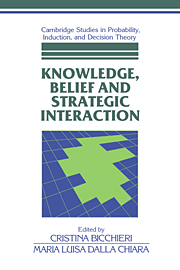Book contents
- Frontmatter
- Contents
- Preface
- List of contributors
- 1 Feasibility
- 2 Elicitation for games
- 3 Equilibrium, common knowledge, and optimal sequential decisions
- 4 Rational choice in the context of ideal games
- 5 Hyperrational games: Concept and resolutions
- 6 Equilibria and the dynamics of rational deliberation
- 7 Tortuous labyrinth: Noncooperative normal-form games between hyperrational players
- 8 On consistency properties of some strongly implementable social choice rules with endogenous agenda formation
- 9 Algorithmic knowledge and game theory
- 10 Possible worlds, counterfactuals, and epistemic operators
- 11 Semantical aspects of quantified modal logic
- 12 Epistemic logic and game theory
- 13 Abstract notions of simultaneous equilibrium and their uses
- 14 Representing facts
- 15 Introduction to metamoral
- 16 The logic of Ulam's games with lies
- 17 The acquisition of common knowledge
- 18 The electronic mail game: Strategic behavior under “almost common knowledge”
- 19 Knowledge-dependent games: Backward induction
- 20 Common knowledge and games with perfect information
- 21 Game solutions and the normal form
- 22 The dynamics of belief systems: Foundations versus coherence theories
- 23 Counterfactuals and a theory of equilibrium in games
Preface
Published online by Cambridge University Press: 05 November 2011
- Frontmatter
- Contents
- Preface
- List of contributors
- 1 Feasibility
- 2 Elicitation for games
- 3 Equilibrium, common knowledge, and optimal sequential decisions
- 4 Rational choice in the context of ideal games
- 5 Hyperrational games: Concept and resolutions
- 6 Equilibria and the dynamics of rational deliberation
- 7 Tortuous labyrinth: Noncooperative normal-form games between hyperrational players
- 8 On consistency properties of some strongly implementable social choice rules with endogenous agenda formation
- 9 Algorithmic knowledge and game theory
- 10 Possible worlds, counterfactuals, and epistemic operators
- 11 Semantical aspects of quantified modal logic
- 12 Epistemic logic and game theory
- 13 Abstract notions of simultaneous equilibrium and their uses
- 14 Representing facts
- 15 Introduction to metamoral
- 16 The logic of Ulam's games with lies
- 17 The acquisition of common knowledge
- 18 The electronic mail game: Strategic behavior under “almost common knowledge”
- 19 Knowledge-dependent games: Backward induction
- 20 Common knowledge and games with perfect information
- 21 Game solutions and the normal form
- 22 The dynamics of belief systems: Foundations versus coherence theories
- 23 Counterfactuals and a theory of equilibrium in games
Summary
This book collects the papers presented at the workshop on “Knowledge, Belief, and Strategic Interaction,” which took place in Castiglioncello, Italy, in June 1989. The workshop was a first attempt at an exchange between philosophers and game theorists, as in recent years game theorists have shown a growing interest in foundational problems and there are several areas in which their concerns overlap with those of philosophers.
Philosophers have a tradition of inquiring into topics such as rationality, learning, and knowledge, as well as the practical reasoning that results in deliberation and decision making. These issues have been mainly studied in an individual context: The knowing subject is depicted as facing a stationary natural environment of which he tries to explain and predict some features. Game theorists are equally involved in defining rationality, learning, and knowledge, although the environment faced by the individual is not a natural but a social one. In a game-theoretic context, one's knowledge or beliefs are about what other players plan to do, which is in turn determined by what these players know (or believe) about one's choices. This interdependency is captured by the concept of Nash equilibrium, which is the most common solution for noncooperative games. A traditional argument for the predictive significance of Nash equilibria asserts that a virtual process of reflection about what other rational players should expect, and accordingly should do, will converge to an equilibrium, so that rational agents who understand the game and think it through thoroughly before choosing their action should play in this way, even if the game is played only once.
- Type
- Chapter
- Information
- Knowledge, Belief, and Strategic Interaction , pp. vii - xiiiPublisher: Cambridge University PressPrint publication year: 1992



